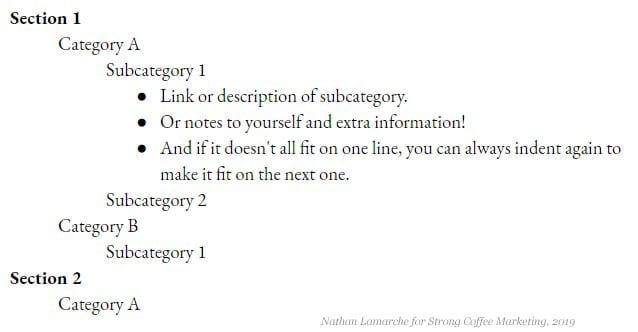So you have your tone, you know what you’re writing about, and it’s time to write… right? Well, no. If you start writing now, you’ll get writer’s block, it’ll go slowly, and you’ll never feel like you’re done revising. Here’s what to do first.
Plan
Create categories for the things going in your article. Do some research if you have to, and place links in your plan along with a brief description. It doesn’t even need to be cohesive, you just need to understand it.
If you’re having trouble organising content, try bullet points, list forms, or tabbing items. For instance…

This way, you can write a structured paragraph little by little, going back to remove or insert new information as needed. It’s easy to find and access. Over time, you can flesh out your short points without making a mess of a paragraph, then expand on them until they become something more complete.
Fact Check
Doing your research is extremely important. Making a single factual mistake can really affect how well your article comes across, even if it’s not something you’d think of as that important or relevant. Don’t read an article and assume that whoever wrote it did their research. Online maps are often outdated or incorrect. Wikipedia can be edited by anyone. Check statements and quotes, or call someone and ask.
Subtitles
Subtitles, just like you see in this article, are incredibly useful. Have you ever scrolled through an article faster than you could read it, skimming one word every few sentences? Subtitles stand out and bring people in. Even if it’s not exactly what they’ve been searching for, a subtitle can stop and force someone to read.
Subtitles create more manageable content for readers, but that’s not all they’re useful for. Subtitles are important for search engine optimisation (SEO), especially if your subtitle and paragraph are closely related. SEO is useful, but don’t focus too much on it. It’s only beneficial if you already have enough traffic to your website. If you’re including them for the SEO value, don’t try to include puns to clever remarks that might make them seem unrelated to the text. That said, your primary audience isn’t a search engine, it’s humans. Don’t try to write for SEO, write for your readers.
Ask Yourself Questions
Questioning yourself is by far your most powerful tool. Questions are useful for fiction, essays, articles, and literally every other form of writing. You might not use them for a casual work email, but you should definitely be asking yourself some of these when writing an article.
- Why am I writing this article?
- Does this add anything to the piece? Does it need to be there?
- Can I remove anything without changing the message?
- Is the message clear with what I’ve written, or is there potential for confusion?
- Does this tone have the potential to come across in a way I don’t want it to, even if it wouldn’t to me?
- Who might read this article? Have I done what I can to accommodate them?
- Is there anything else I need to add or should add?
- What can I do to improve readability?
If you’re ready, move on to the next step to write the article.
Recent Posts
Boost Business Efficiency with Google Workspace Automation Tools
Streamlining Your Business with Google-Based Automations Hey there, fellow business owners! If you’re like most of us, you probably feel like there just...
Harnessing Google Tag Manager for Better User Insights and Performance Tracking
Unlocking the Power of Google Tag Manager: Simplifying Tracking and Understanding User Behavior Hey there, fellow business owners! If you’re navigating the digital...
AI Max: Transform Your Google Search Ads Strategy Today
Unleashing the Power of AI with Google Ads’ New AI Max Hey there, fellow business owners! If you’re anything like us at Strong...


